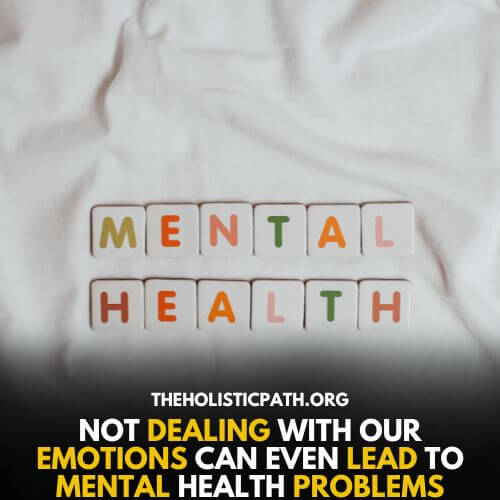When emotions take over, it can be difficult to make sound decisions. Emotions can cloud our judgment and lead us astray. In some cases, we may even act in ways that are contrary to our own best interests. This is why it’s important to learn how to deal with our emotions so that they don’t have a negative impact on our lives.
What Are Emotions And How Do They Work
When most people think of emotions, they think of the basic ones like happiness, sadness, anger, and fear. However, there are actually many different types of emotions, and each one can serve a different purpose. Emotions work by activating the autonomic nervous system.
This system is responsible for regulating all of the body’s involuntary functions, including heart rate, breathing, and digestion. When we experience an emotion, it causes a physical reaction in the body. For example, when we feel afraid, our heart rate speeds up and we may start to sweat.
How Do Emotions Affect Our Behavior?
Emotions can affect our behavior in a number of ways. They can cause us to act impulsively or without thinking things through properly. They can also lead us to make bad decisions or take risks that we wouldn’t normally take. In some cases, emotions can even make us do things that are harmful to ourselves or to others.
How Emotions Can Take Over Our Lives
It is not unusual to hear someone say that they were not themselves when they acted in a way that was out of character. This is because our emotions can take control of our lives, leading us to do things we would not normally do. There are several reasons why this happens.
Emotions play a huge role in our lives. They can dictate how we think, how we feel, and how we act. Emotions can be incredibly powerful and overwhelming. We may not always have control over our emotions, but it’s important to understand why they take over our lives and the effects that they can have.
There are a number of reasons why emotions can take over our lives. For one, emotions can be incredibly strong and hard to ignore. They can make us feel happy, sad, excited, scared, and a million other things all at once.
Emotions can also be contagious. If someone around us is feeling a certain way, it’s easy for that emotion to rub off on us.
Another reason why emotions can take over our lives is that we often give them too much power. We may let them dictate how we think or how we feel about ourselves. We may also act on our emotions without thinking things through first. This can lead to bad decisions or harmful behaviors.
It’s important to remember that emotions are just a part of who we are. They don’t define us and we don’t have to let them control us. We can learn to manage our emotions and deal with them in a healthy way. By doing so, we’ll be able to live happier, healthier lives.

All of these factors together show how emotions can take over our lives and lead us to do things that we would not normally do. It is important to be aware of this so that we can manage our emotions effectively and stay in control.
What Emotions Take Over People And What Triggers Them
Anxiety Can Control You Before You Know It:
Anxiety is a feeling of fear or worry that can be mild or severe. It can be caused by stress, a traumatic event, or an illness. When people are anxious, they may feel restless, have trouble concentrating, or feel like they are in danger.
Some people may also have physical symptoms such as a racing heart, sweating, or dizziness.
There are many things that can trigger anxiety, including:
- Stressful events or situations.
- Traumatic events- such as a car accident.
- Fear of things like public speaking or spiders.
- Medical problems such as heart disease or diabetes.
- Drugs and alcohol.
- Caffeine.
- Nicotine.
When Emotions Take Over Anger Is The First To Effect:
People can feel anger for a number of reasons. Some people may become angry when they are frustrated, when they are treated unfairly, or when they are in danger. Some common triggers for anger include feeling ignored, feeling disrespected, and feeling threatened.
When someone feels angry, their body goes into “fight or flight” mode. This means that the person’s heart rate increases, their breathing speeds up, and their muscles tense up. This is all part of the body’s natural response to danger.
The person’s mind also goes into “fight or flight” mode. This means that the person’s focus shifts to the danger that they are facing, and they may start to think about ways to solve the problem. This can lead to aggressive behavior or rash decisions.
Fear Can Take Over Us:
Fear is another emotion that can take over people. Fear can be triggered by things like loud noises, unexpected movements, or scary images. When someone is afraid, their body goes into “fight or flight” mode just like with anger.
The person’s mind also goes into “fight or flight” mode. This means that the person may start to worry about what could happen if they don’t escape the situation. This can lead to feelings of anxiety and panic.
How To Identify When Emotions Are Taking Over
There are a few key ways to identify when emotions are taking over:
The first step is to be aware of the signs that your emotions are taking over. Some common signs include:
- You feel like you can’t think straight.
- You can’t concentrate on anything else.
- You feel overwhelmed.
- You feel out of control.
If you are experiencing any of these signs, it means that your emotions are taking over and you need to take action to regain control.
The next step is to identify what emotions are taking over. This can be done by paying attention to the physical sensations you are feeling and the thoughts you are having. Some common emotions that take over include anger, anxiety, sadness, and fear.
Once you have identified the emotion, you need to figure out what is causing it. This can be done by exploring the thoughts and memories that are associated with the emotion.
For example, if you are feeling anxious, you might explore the thoughts and memories that are causing the anxiety.

Once you have identified the cause of the emotion, you can start to develop a plan to manage it. This might involve challenging the thoughts that are causing the emotion or using coping skills to manage the physical sensations.
How To Deal With Emotions When They Take Over
Managing our emotions when they take over can be difficult, but there are things we can do to help. One of the best ways is to learn how to manage them using techniques like mindfulness meditation.
This type of meditation allows us to become aware of our thoughts and feelings, and it helps us to manage them more effectively.
Another way to deal with emotions is by talking about them. This can be done with a friend, family member, or therapist. Talking about our feelings helps us to understand them better, and it also allows us to release the emotional energy that’s been building up inside of us.
Finally, we can also use self-care techniques to deal with our emotions. These techniques include things like exercise, relaxation exercises, and healthy eating habits. When we take care of ourselves physically, it can help us feel better emotionally as well.
1. Acknowledge The Feeling:
When you feel an emotion taking over, acknowledge the feeling. Don’t try to ignore it or push it away. Instead, simply notice what you’re feeling and give it a name. This will help you to start to understand and manage your emotions better.

Saying to yourself “I’m feeling really angry right now” or “I’m feeling really sad” can help you to better understand and manage the emotion.
2. Identify The Cause Of The Emotion:
Once you’ve acknowledged the emotion, it’s important to try and identify what caused it. This can be difficult, but often times simply acknowledging the feeling and trying to understand where it came from can help to diminish its power over you.
For example, if you’re feeling angry, try to identify what specifically made you angry and why.
3. Express Your Emotions:
It can also be helpful to express your emotions instead of keeping them bottled up. This means talking about how you’re feeling with someone you trust, writing in a journal, or painting/drawing what you’re feeling. Expressing your emotions can help you to release them and feel better.
4. When Emotions Take Over – Don’t judge yourself:
When you’re struggling with strong emotions, it’s easy to start judging yourself harshly. But don’t do this! Accepting your feelings is the first step toward managing them effectively. So be gentle with yourself and don’t beat yourself up over what you’re feeling.

5. Don’t Dwell On The Emotion:
Once you’ve identified the cause of the emotion, don’t dwell on it. This will only serve to aggravate and amplify the feeling. Instead, try to focus on ways to resolve or manage the emotion.
6. Breath:
When emotions are taking over, it’s often difficult to think straight. One way to calm yourself down and get your thoughts in order is to focus on your breathing. Slow, deep breaths will help to soothe your mind and body and can help you to regain control.
7. Take A Break When Emotions Take Over:
If emotions are getting too much for you, take a break. Step away from whatever is causing the emotional reaction and give yourself some time alone. This can help to calm down the emotional storm and allow you to approach the issue later with a cooler head.
8. Talk About It:
Sometimes the best way to deal with strong emotions is to talk about them. Find someone who will listen without judgment and let them know what’s going on inside your head. Talking openly and honestly can be really helpful in managing challenging emotions.

9. Use Coping Mechanisms:
There are a variety of coping mechanisms that can help you deal with emotions when they take over. Some people find that exercise or meditation helps them calm down and manage their emotions, while others find comfort in writing out their feelings or talking to a friend.
Find what works best for you and make sure to use it when needed.
10. When Emotions Take Over – Don’t Be Afraid To Seek Help:
If you find that you’re struggling to manage your emotions on your own, don’t be afraid to seek help from a therapist or counselor. They can provide guidance and support in helping you deal with your emotions effectively.
11. Stay in the present:
When you are feeling overwhelmed by your emotions, it can be helpful to stay in the present as much as possible. This means focusing on your surroundings and what is happening at the moment. This can help to keep you from getting lost in your thoughts and feelings.
12. Exercising:
Exercise releases endorphins, which have mood-boosting effects. It can be the best way to deal when emotions take over and take back charge.
13. Staying grounded:
When emotions take over, it can feel like we’re on a rollercoaster – up one minute and down the next. Staying grounded can help us to deal with these strong emotions and ride out the storm. Anchoring ourselves in the present moment can help to bring some calm amidst the chaos.
Instead of getting lost in our thoughts, we can focus on our breath or on grounding objects nearby. This can help to remind us that we are safe and that the emotional storm will eventually pass. Staying grounded is a simple but powerful tool that can help us to weather any storm.
14. Distracting yourself:
When emotions take over, it can be tough to think straight. You might find yourself obsessing over what’s making you upset or struggling to concentrate on anything else.
In situations like these, it can be helpful to distract yourself. By focusing on something else, even for just a few minutes, you can give yourself a mental break and help to refocus your thoughts.
15. Practice gratitude:
When you’re feeling down, it can be tough to see the silver lining. But according to some experts, gratitude may be the key to finding it. When emotions take over, it’s easy to get caught up in negative thoughts and miss all the good things in your life.
Practicing gratitude means making a conscious effort to focus on the positive. It can help you appreciate what you have, instead of dwelling on what you don’t. And when you start to focus on the good, it can be easier to let go of the bad.
So if you’re feeling overwhelmed by emotions, try thinking of something you’re grateful for. It might just help you find your way back to a better state of mind.
16. Meditation:
Meditation is a great way to focus on your emotions and control them. When you are able to focus on your thoughts and feelings, you can better understand them and work on controlling them.
17. Positive Reinforcement:
We’ve all been there before – when emotions take over and we can’t think straight. It might be during a heated argument with a loved one, or when we’re feeling overwhelmed by a project at work. In these moments, it can be hard to remember what we’re supposed to do.
That’s where positive reinforcement comes in. Positive reinforcement is when we give ourselves a reward for exhibiting the behavior that we want. Like, if we’re trying to stay calm during an emotional situation, we might give ourselves a small treat after we’ve successfully managed to do so.
This helps to reinforce the desired behavior and makes it more likely that we’ll be able to do it again in the future. So next time you’re feeling emotional overwhelm, try using positive reinforcement to help you stay calm and in control.
18. Setting Boundaries:
Anyone who’s ever been overwhelmed by their emotions knows that it can be a difficult and frustrating experience. But what many people don’t realize is that setting boundaries can help to deal with emotional overtake.
By definition, when emotions take over, we are no longer in control of our thoughts or actions. This can lead to impulsive decision making, hurtful words, and regretted actions. However, when we set boundaries, we create a space between us and our emotions.
This allows us to step back and see the situation more clearly. We can then make decisions based on reason, rather than being controlled by our emotions. As a result, setting boundaries can help to prevent us from being overtaken by our emotions.
The Consequences Of Not Taking Action When Emotions Take Over
When emotions take over it’s very important to deal with them, because it can lead to a lot of negative consequences. For example, it can cause us to lash out at people we care about, or make impulsive decisions that we later regret.
In some cases, not dealing with our emotions can even lead to mental health problems like anxiety or depression. This is because the emotional energy that’s been building up inside of us can start to take its toll on our mental health.

Not dealing with our emotions can also lead to physical health problems. This is because the fight or flight response is a physical response, and it can cause our heart rate to increase and our muscles to tense up. This can lead to things like heart disease and anxiety.
The consequences of not taking action when emotions take over can be destructive both mentally and physically:
- They can lead to mental health problems such as depression, anxiety, and stress.
- They can also lead to physical health problems such as heart disease, obesity, and cancer.
- They can cause people to make bad decisions and act impulsively.
- They can ruin relationships with friends, family, and romantic partners.
- They can cause people to isolate themselves from others.
- The person may feel isolated and alone as if no one understands what they are going through.
- One may act impulsively or in ways that are harmful to themselves or others.
- When emotions take over they can make it difficult to sleep, eat, or concentrate on anything else other than their emotions.
Tips For Keeping Your Emotions In Check
- Recognize your triggers: It’s important to be aware of what sets you off so that you can take steps to avoid or diffuse them. For instance, if you know that getting into a heated argument with your partner makes you feel overwhelmed and out of control, try to steer clear of those situations or have a plan in place to help you stay calm.
- Take some time for yourself: When you’re feeling overwhelmed or stressed, take a few minutes for yourself to decompress. This could mean taking a hot bath, reading your favorite book, taking a walk around the block, or spending time in nature.
- Connect with loved ones: When you’re feeling down or struggling, connect with loved ones who can offer emotional support. Talking about how you’re feeling and hearing that you’re not alone can help make you feel better.
- Practice self-compassion: Be kind to yourself when things are tough. Accepting that you’re human and will occasionally have negative emotions is an important part of self-compassion.
- Seek professional help if needed: If your negative emotions are impacting your day-to-day life and causing distress, it’s worth considering seeking professional help. A therapist can provide guidance and support as you work through your feelings.
- Keep a journal: Write down your thoughts and feelings in a journal. This can help you to identify any patterns in your emotions and work to address them.
- Talk to someone: When you’re feeling overwhelmed by your emotions, talking to someone can be really helpful. Talk to a friend, family member, therapist, or any other support system who can help you process what you’re feeling.
When Emotions Take Over – Takeaway:
When it comes to our emotions, it’s often hard to keep them in check. Our feelings can often take over, and we can find ourselves doing and saying things that we later regret. While it’s okay to let our emotions out every once in a while, we should try to be mindful of when they’re taking over.
If you find yourself getting angry or upset easily, take some time to reflect on why that might be. Are there certain things that trigger your emotions? Once you know what sets you off, you can start to work on handling those situations better. You might not be able to get rid of your emotions entirely, but by being mindful of them, you can at least keep them under control.
